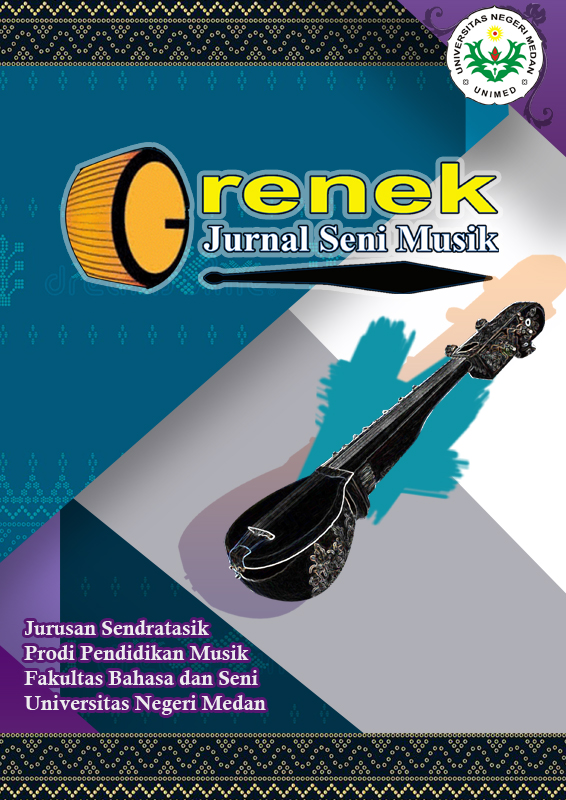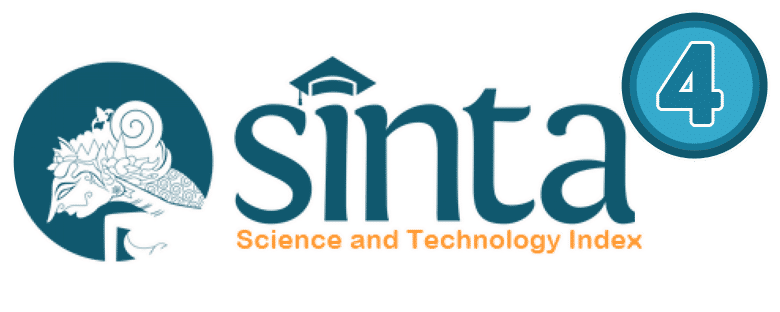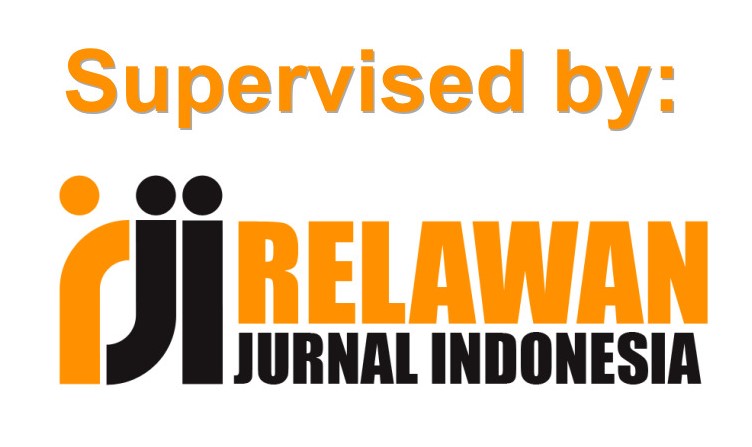Gradual Drum Curriculum For Elementary Students: Integrating Reading Notation and Performance Practice
DOI:
https://doi.org/10.24114/grenek.v14i1.65622Keywords:
Drum Curriculum, Gradual approach, Non-formal educationAbstract
This research examines the development of the drum curriculum at Favore Music with a gradual approach to reading and playing notation. The research method used is descriptive qualitative with data collection techniques through observation, interviews, and documentation. The results show that a gradual approach to learning drums improves the understanding of notation systematically, starting from simple to complex rhythmic patterns. This learning model integrates hand-foot coordination techniques, improvisation, and exploration of various musical genres. The implementation of this curriculum not only has an impact on improving students' technical skills but also motivates them to learn in a more interactive and enjoyable way. With an adaptive learning structure, this curriculum can be applied in various music education contexts. These findings contribute to innovation in music education, especially in more effective and structured drumming.References
Anderson, A. (2024). Curriculum power positioning in classroom music education: music curriculum design in the secondary music classroom in England. Arts Education Policy Review, 125(2), 94–107.
Bernāts, G., & Mūrnieks, A. (2021). The Challenges, Risks And Prospects Of The Realisation Of The Music Methodology Module Of One – Year Education Programme. Education Innovation Diversity, 1(2), 24–30.
Bonacina, S., Krizman, J., White-Schwoch, T., Nicol, T., & Kraus, N. (2021). Clapping in Time With Feedback Relates Pervasively With Other Rhythmic Skills of Adolescents and Young Adults. Perceptual and Motor Skills, 128(3), 952–968.
Burger, B., & Wöllner, C. (2023). Drumming Action and Perception: How the Movements of a Professional Drummer Influence Experiences of Tempo, Time, and Expressivity. Music and Science, 6.
Cahart, M. S., Amad, A., Draper, S. B., Lowry, R. G., Marino, L., Carey, C., Ginestet, C. E., Smith, M. S., & Williams, S. C. R. (2022). The effect of learning to drum on behavior and brain function in autistic adolescents. Proceedings of the National Academy of Sciences of the United States of America, 119(23), 1–12.
Camlin, D. A., & Lisboa, T. (2021). The digital ‘turn’ in music education (editorial). Music Education Research, 23(2), 129–138.
CAO, J. (2024). Enhancing Student Engagement and Learning Outcomes through Interactive Approaches in College Vocal Music Instruction. Pacific International Journal, 7(1), 131–136.
Craddock, L., Kells, M., Morgan, L., & Shah-Beckley, I. (2022). Drumming, singing and ceremony within a psychologically informed planned environment for women on the offender personality disorder pathway. The Journal of Forensic Practice, 24(2), 123–137.
Creswell, J. W., & Creswell, J. D. (2022). Research Design: Qualitative, Quantitative, and Mixed Methods Approaches. America: SAGE Publications.
Dian Aprelia Rukmi, Firotun Nisa, A., Yustina, A., Vitriani, D., & Nurhayati, S. (2023). Pembelajaran Berdiferensiasi Dalam Menumbuhkan Percaya Diri Siswa Sd. Jurnal Ilmiah Pendidikan Citra Bakti, 10(4), 798–810.
Ghasanni, R. I., Erhamwilda, & Khambali. (2023). Peningkatan Kemampuan Pengenalan Huruf pada Anak Melalui Permainan Fishing Alfabet. Jurnal Riset Pendidikan Guru Paud, 103–108.
Hamdani, A. D., Nurhafsah, N., & Silvia, S. (2022). Inovasi Pendidikan Karakter Dalam Menciptakan Generasi Emas 2045. JPG: Jurnal Pendidikan Guru, 3(3), 170.
Hui, L. C., & Wong, W. H. Y. (2023). A Study of Music Curriculum Design Strategies in the Context of Core Literacy——A Qualitative Study Based on Grounded Theory. International Journal of Academic Research in Progressive Education and Development, 12(1), 1229–1244.
Kai Ti, S., & Wong, K. Y. (2024). The Impact of Popular Music Teaching in Music Classrooms: Perspectives of Malaysian Primary School Music Teachers. Malaysian Journal of Social Sciences and Humanities (MJSSH), 9(5), e002826.
Khairunnisa, A. D. (2024). Model Pembelajaran Cooperative Script Dalam Meningkatkan Keterampilan Membaca Intensif Siswa Kelas IV SD. TEACHING: Jurnal Inovasi Keguruan Dan Ilmu Pendidikan, 4(3), 229–236.
Leavy, P. (2024). Writing and Publishing Qualitative Research. America: Guilford Publications.
Lesmana, I., Burhanuddin, B., & Sunandar, A. (2024). Eksistensi Kurikulum Kolaboratif di Sekolah Dasar Berbasis Islam dalam Upaya Mempersiapkan Mutu Lulusan Unggul. JAMP: Jurnal Administrasi Dan Manajemen Pendidikan, 7(2), 184.
Maharani, A. A. (2022). Keterampilan Membaca Notasi Balok Rosa Mystica Choir Dalam Tinjauan Kognitif. Repertoar Journal, 3(1), 93–103.
Mayuri Putri, I. S., Amri, S., & Anggraini, R. S. (2024). Penerapan Pendidikan Matematika Realistik (Pmr) Pada Materi Satuan Panjang. Edumatic, 5(1), 9–14.
Metzler-Baddeley, C., Busse, M., Drew, C., Pallmann, P., Cantera, J., Ioakeimidis, V., & Rosser, A. (2023). HD-DRUM, a Tablet-Based Drumming Training App Intervention for People With Huntington Disease: App Development Study. JMIR Formative Research, 7.
Miles, M. B., Huberman, A. M., & Saldana, J. (2013). Qualitative Data Analysis: A Methods Sourcebook. America: SAGE Publications.
Mito, H., & Kinjo, H. (2023). A cross-sectional study on relationships between musical activities and quality of life in Japanese older adults. Research Studies in Music Education, 45(1), 37–55.
Miyazaki, A., Okuyama, T., Mori, H., Sato, K., Ichiki, M., & Nouchi, R. (2020). Drum Communication Program Intervention in Older Adults With Cognitive Impairment and Dementia at Nursing Home: Preliminary Evidence From Pilot Randomized Controlled Trial. Frontiers in Aging Neuroscience, 12(July), 1–19.
Mutohhari, F., Sutiman, S., Nurtanto, M., Kholifah, N., & Samsudin, A. (2021). Difficulties in implementing 21st century skills competence in vocational education learning. International Journal of Evaluation and Research in Education, 10(4), 1229–1236.
Ng, H. H. (2023). Facilitating Collective Free Improvisation Learning in Teacher Education. Journal of Music Teacher Education, 33(1), 15–30.
Nikolaou, E. (2024). Encouraging creativity through music improvisation activities: Pre-service primary general teacher-students’ reflections and beliefs. International Journal of Music Education, 42(3), 461–479.
Patria, P. R. E., & Zulkarnaen, Z. (2023). Pengelolaan Manajemen Kurikulum Pendidikan Anak Usia Dini. Jurnal Obsesi : Jurnal Pendidikan Anak Usia Dini, 7(4), 4199–4208.
Rosyida, E., Listiyono, H., & Zuliarso, E. (2024). Rancang Bangun Game Edukasi Pembelajaran Huruf Alfabet Pada Anak Usia Dini Menggunakan Metode Multimedia Development Life Cycle. Jurnal JTIK (Jurnal Teknologi Informasi Dan Komunikasi), 8(3), 549–555.
Silva, E. F. da, Mignaco, J. A., & Prosdocimi, F. (2024). Biosongs: enhancing cognition and emotional development through an active teaching-learning method in biosciences. Brazilian Journal of Development, 10(3), e68092.
Siregar, L. S., & Mashudi, E. A. (2024). Transformasi Pendidikan: Implementasi Manajemen Kurikulum Merdeka Belajar. Kumarottama: Jurnal Pendidikan Anak Usia Dini, 3(2), 138–152.
Zou, H., & Xia, Y. (2022). Design of Adaptive Iterative Reconstruction Method for Music Curriculum Integration and Reconstruction. Mobile Information Systems.
Downloads
Published
Issue
Section
License
Copyright (c) 2025 Piter Sembiring, Yudi Sukmayadi , Sandie Gunara

This work is licensed under a Creative Commons Attribution-ShareAlike 4.0 International License.
Authors published with the Grenek: Jurnal Seni Musik agree to the following terms:
- Authors retain copyright and grant the journal the right of first publication with the work simultaneously licensed under a Creative Commons Attribution License (CC BY-SA 4.0) that allows others to share the work with an acknowledgment of the work's authorship and initial publication in this journal.
- Authors are able to enter into separate, additional contractual arrangements for the non-exclusive distribution of the journal's published version of the work (e.g., post it to an institutional repository or publish it in a book), with an acknowledgment of its initial publication in this journal.
- Authors are permitted and encouraged to post their work online (e.g., in institutional repositories or on their website) prior to and during the submission process, as it can lead to productive exchanges, as well as earlier and greater citation of published work. (See The Effect of Open Access)








